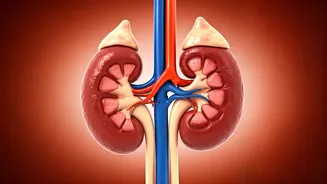Morning Habits Matter
The kidneys are essential organs that work tirelessly to filter waste and maintain overall health. Many people unwittingly engage in habits each morning
that can undermine this vital process. According to a senior urologist, there are several common morning routines that can be detrimental to kidney health. These habits may seem harmless on the surface but can lead to long-term issues if not addressed. Understanding these habits is the first step towards making positive changes and safeguarding kidney function. Prioritizing kidney health involves being mindful of daily routines and making adjustments to promote optimal function.
No Water First
One of the most damaging morning habits is neglecting to drink water first thing. During the night, the body is in a state of relative dehydration. Not replenishing fluids in the morning can put undue stress on the kidneys. They have to work harder to filter and eliminate waste when the body is dehydrated. Drinking water stimulates kidney function, aids in waste removal, and promotes optimal blood flow. Starting the day with a glass of water ensures that the kidneys operate efficiently from the outset. This simple act can set the stage for better kidney health and overall well-being. Keeping the body hydrated is critical to assist the kidneys in their function of filtering waste.
Empty Stomach Painkillers
Taking painkillers on an empty stomach is another risky behavior. Many common over-the-counter and prescription pain medications can be harmful to the kidneys, especially when taken without food. These medications can reduce blood flow to the kidneys, potentially leading to acute or chronic kidney damage. The stomach lining can become sensitive when not supported by food and medication can worsen any existing problems. The kidneys need a stable supply of blood to function correctly. Taking painkillers with a full stomach can protect the kidneys and reduce the risk of adverse effects. Always take medication as directed and consult a healthcare professional for guidance.
Post-Workout Dehydration
Failing to rehydrate after exercising is a significant oversight. Physical activity causes the body to lose fluids through sweat, straining the kidneys as they attempt to maintain balance. Neglecting to replace these fluids can lead to electrolyte imbalances, decreased kidney function, and potentially serious complications. Proper hydration is critical for muscle recovery, temperature regulation, and overall performance, but it's also essential for kidney health. Ensure to drink sufficient water or electrolyte-rich beverages after exercising to replenish fluids and support kidney function. Prioritizing hydration after physical activity can help safeguard the health of the kidneys.
Skipping Breakfast Completely
Skipping breakfast, a common habit, can significantly impact kidney health. The body needs fuel to function efficiently, and breakfast provides the initial energy boost to start the day. Not eating in the morning can lead to metabolic imbalances, including blood sugar fluctuations and changes in blood pressure, all of which stress the kidneys. A nutritious breakfast, on the other hand, stabilizes blood sugar levels and supports overall kidney health. Consider a breakfast rich in whole grains, fruits, and lean proteins to provide sustained energy and support your kidneys. Providing the body with essential nutrients helps prevent any possible strain that comes from low blood sugar levels.
Ignoring Morning Urges
Ignoring the urge to urinate in the morning is a habit with potentially serious consequences. Holding urine for extended periods puts pressure on the bladder and can cause urinary tract infections, which, if left untreated, can affect the kidneys. Regular emptying of the bladder helps prevent the buildup of harmful substances and supports the overall health of the urinary system. It also protects kidney function. Make it a routine to empty your bladder promptly when you feel the urge. This simple act contributes significantly to maintaining kidney health. Pay attention to your body's signals and prioritize bladder health for overall well-being.


















